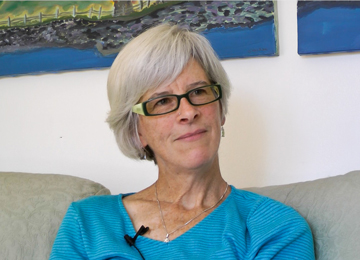Julia

3 years since diagnosis
Age at interview: 63
Julia is married and has three grown children. She and her husband own and operate a holiday resort.
Julia received her diagnosis in 2012. She had discovered a cyst in her breast and wanted it to be removed when a friend of hers, who is a doctor, advised her to always get any lumps removed. She was referred to a surgeon who was willing to remove the cyst but was worried that removal would cause scar tissue making it more difficult to detect the presence of other lumps. The surgeon wasn’t worried about how the lump felt but suggested a mammogram and ultrasound to be sure. The results of the mammogram were good but Julia was advised to have a follow-up after 6 months. During the second mammogram, she learned from a nurse that something abnormal had been found in her first ultrasound. Julia underwent further testing, an ultrasound and a needle biopsy, but the results remained inconclusive. A core biopsy followed just before Christmas. Julia had a very strong feeling about what the result would be based on the way the surgeon acted, although she would likely only find out after Christmas. Julia and her husband decided not to tell anyone until the results were known. In January, she was called by her doctor with the news that it was indeed invasive breast cancer. After a lumpectomy, with unclear margins, Julia decided to undergo a full mastectomy. She understood from all she had heard and read that she would not need radiation if her breast was removed. So, she was very upset when her oncologist, during her first visit, to be told that she needed to see a radiation oncologist. Julia was afraid that she had lost the breast for nothing. However, the radiation oncologist, who really took his time to explain the process to her, agreed that there was no need for radiation. Julia tried to take Tamoxifen twice; the first time she felt very tired and with the second try she experienced extreme anxiety. Her oncologist threatened to refuse to continue seeing Julia when she decided to stop taking hormones and refused to undergo an oophorectomy. They worked it out and Julia was OK to stop seeing the oncologist. She has since been receiving treatments from her naturopath. Julia’s mindfulness practice has helped her through many difficult moments, such as when she is waiting for test results; it helps her to say to herself that she is fine in the current moment. Julia’s relationship with her husband and family has deepened over the course of her treatment, and in the big scheme of things she feels that missing a breast doesn’t make a big difference. She described the moment when she rediscovered joy (during meditation one day) as a beautiful experience – along with a great sense of relief.
More content
- Endocrine (hormone) therapy – JuliaAfter having tried the hormones twice, Julia decided to stop and was then offered a surgery to remove the ovarian tubes (oophorectomy).
- Finding and sharing information – JuliaJulia would have liked to know about resources earlier; she asked her surgeon if she could bring him some material to distribute.
- Positive effects on self – JuliaJulia describes how she has become more assertive and she feels she is better in doing things when she thinks of it.
- Coping strategies – JuliaJulia’s meditation group was a better fit for her needs even though it was not focused on cancer.
- Sexuality, femininity and intimacy – JuliaJulia had to adapt to life after mastectomy but she and her husband were also able to do this successfully.
- Follow-up care and the risk of recurrence – JuliaJulia had a family history of cancer. She is trying to strike a balance between being vigilant and maintaining a sense of optimism.